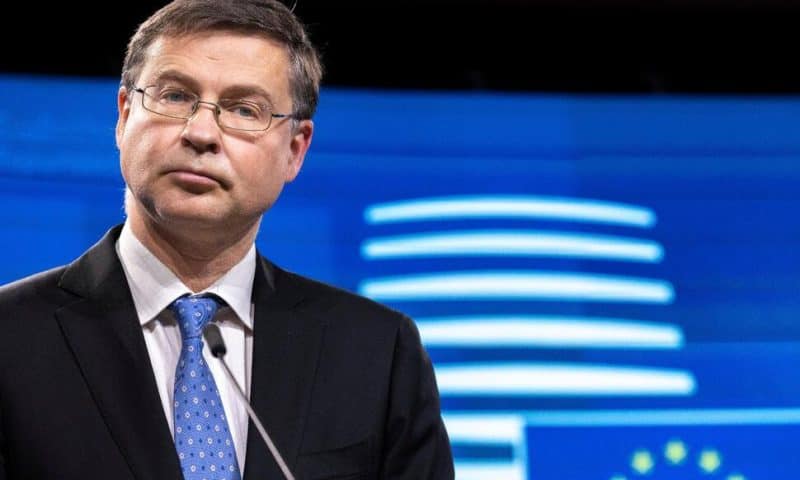The European Union says it’s launched action against China at world trade’s governing body for discriminatory practices against Lithuania.
BRUSSELS — The European Union and China on Thursday stepped up their diplomatic dispute as the EU took a spat over exports problems for member state Lithuania to world trade’s governing body, and accused Beijing of seeking to undermine the 27-nation bloc’s single market.
China retorted that the EU should “distinguish right from wrong.” It said Brussels should get Lithuania to stick to diplomatic relations based on the “one-China” principle at the expense of Taiwan, which Beijing considers part of its territory with no right to diplomatic recognition.
Lithuania broke with diplomatic custom by agreeing that the Taiwanese office in Vilnius would bear the name Taiwan instead of Chinese Taipei, a term used by other countries to avoid offending Beijing.
EU Trade Commissioner Valdis Dombrovskis insisted the bloc was owed more respect and said Beijing should stop coercing member states with heavy-handed trade tactics like blocking imports based on political grounds.
“Our relationship requires mutual respect,” Dombrovskis said as he announced the EU action at the World Trade Organization.
However, China’s foreign affairs spokesman Zhao Lijian insisted the EU should move to counter its member’s approach.
“We also advise the EU to distinguish right from wrong, remain vigilant against Lithuania’s attempts to hijack China-EU relations, and persuade Lithuania, like other EU member states, to fulfill the political commitments it made as establishing diplomatic relations with China,” Zhao said.
“We urge Lithuania to immediately correct its mistake,” he added.
Beijing expelled the Lithuanian ambassador and withdrew its own ambassador. Last month, Lithuania closed its embassy in the Chinese capital. Tensions have mounted, and Lithuania, together with the EU, accuse Beijing of holding up goods, both from the Baltic nation and from EU companies that use Lithuanian components, at China’s borders.
“Let me be clear: these measures are a threat to the integrity of the EU single market so it affects the entire EU trade and EU supply chains, and they have a negative effect on EU industry,” Dombrovskis said.
Even if Lithuania only has a population of 2.8 million, Dombrovkis said not reacting to Beijing’s action could affect the whole bloc of 450 million people.
“China is putting pressure on international companies to abandon the use of Lithuanian components in their production. Otherwise, they may face import restrictions,” said Dombrovskis. Because of it, such an economic move against one member state, made it a trade attack on all.
“The EU is determined to act as one and act fast against measures in breach of WTO rules,” Dombrovskis said. The powerful Federation of German Industries, Germany’s main industry lobby group, said the Chinese measures targeting Lithuania “also are causing significant uncertainty for German companies” that use Lithuanian components.
Lithuania was grateful for the support.
“This step is a clear message to China that the EU will not tolerate politically motivated actions of economic coercion,” Foreign Minister Gabrielius Landsbergis said.
The European Commission manages trade on behalf of the 27 EU member countries. It says it has built up evidence of Chinese restrictions. They include a refusal to clear Lithuanian goods through customs, the rejection of import applications from Lithuania, and pressuring European companies.
The WTO process, though, can take many months, if not years, before a final decision is reached.
Thursday’s move is likely to further dent relations that China long saw as favorable to counterbalance the economic and political strife it faced with the United States. Last year, the EU joined Washington, Britain and Canada in imposing sanctions on Chinese officials over accusations they are linked to the abuse of ethnic minorities. Beijing retaliated by announcing it would penalize four European legislators, among others.
Those countermeasures in effect froze the approval of a potentially massive investment deal between China and the EU which was tentatively agreed in December 2020.

